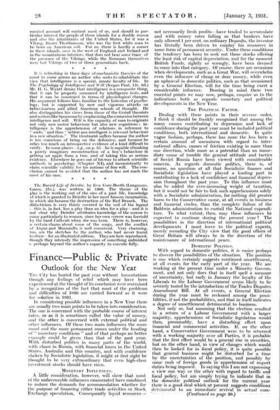It is refreshing in these days of mechanistic theories of
the mind to come across an author who seeks to rehabilitate the view that intelligence is a special, innate faculty of life. In The Psychology of Intelligence and Will (Regan Paul, 12s. 6d.) Mr. H. G. Wyatt denies that intelligence is a composite thing, that it can be properly measured by intelligence tests, and that it can be construed in terms of physiological changes. His argument follows lines familiar to the historian of psycho- logy, but is supported by new and vigorous attacks on behaviourism and allied American schools of thought. He also distinguishes his views from those of the Gestalt theorists and writers like Spearman by emphasizing the connexion between intelligence and will. Wilt is the capacity of man to originate not only new motor behaviour but also new cognitions ; in- telligence is the apprehension of relations in reference to " ends," and thus " action qua intelligent is relevant behaviour in a new situation." The treatment suffers because the author is too conscious of being on the defensive, and because he relies too much on introspective evidence of a kind difficult to verify. In some places—e.g., on p. 35—he is capable of making a purely imaginary reconstruction of a boy's behaviour in getting an apple from a tree, and of taking this as serious evidence. Elsewhere he goes out of his way to attack scientific methods in psychology (Chapter XI), and inconsistently to claim scientific validity for his notions of free will. The con- clusion cannot be avoided that the author has not made the most of his case.
* . *






































 Previous page
Previous page